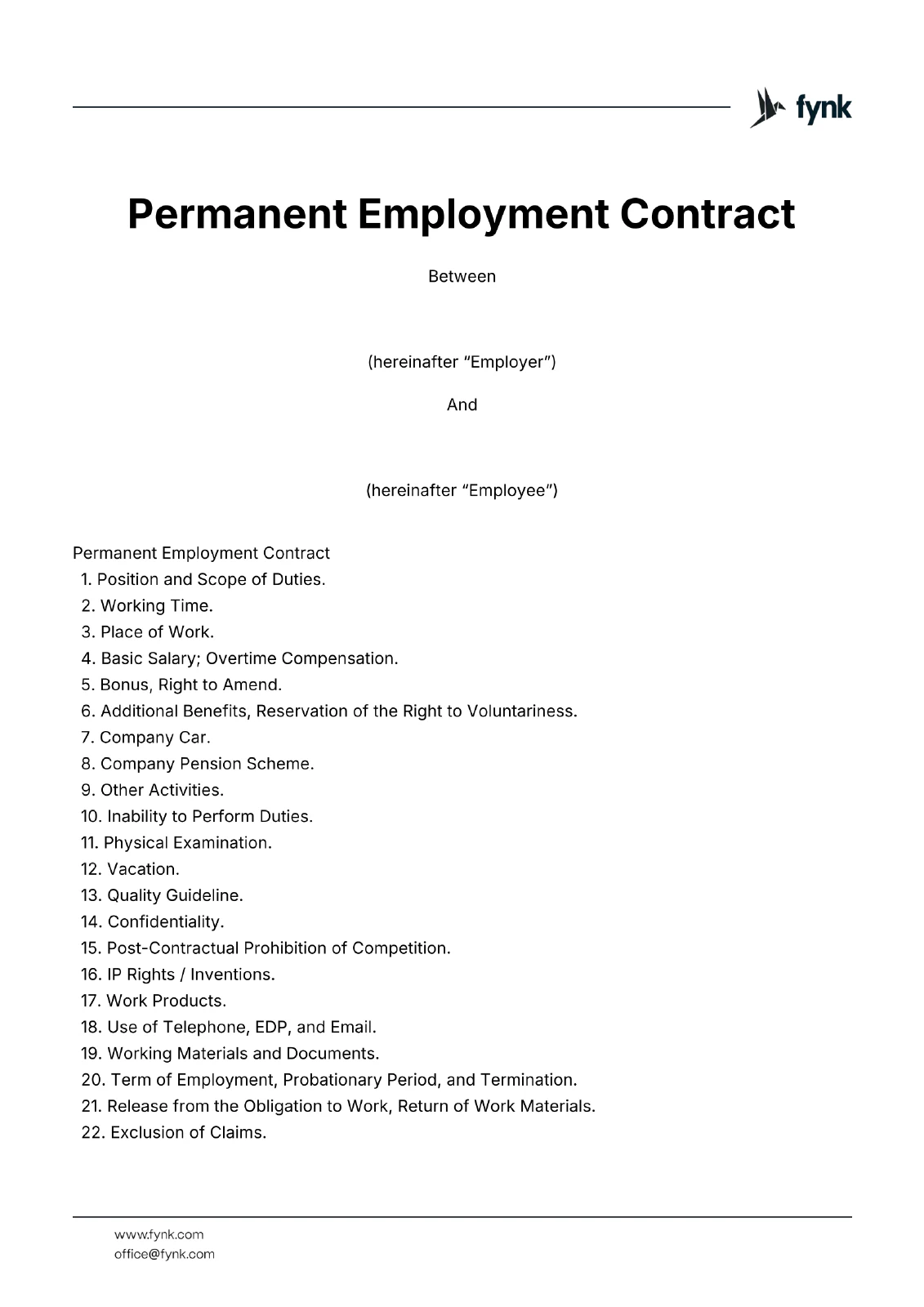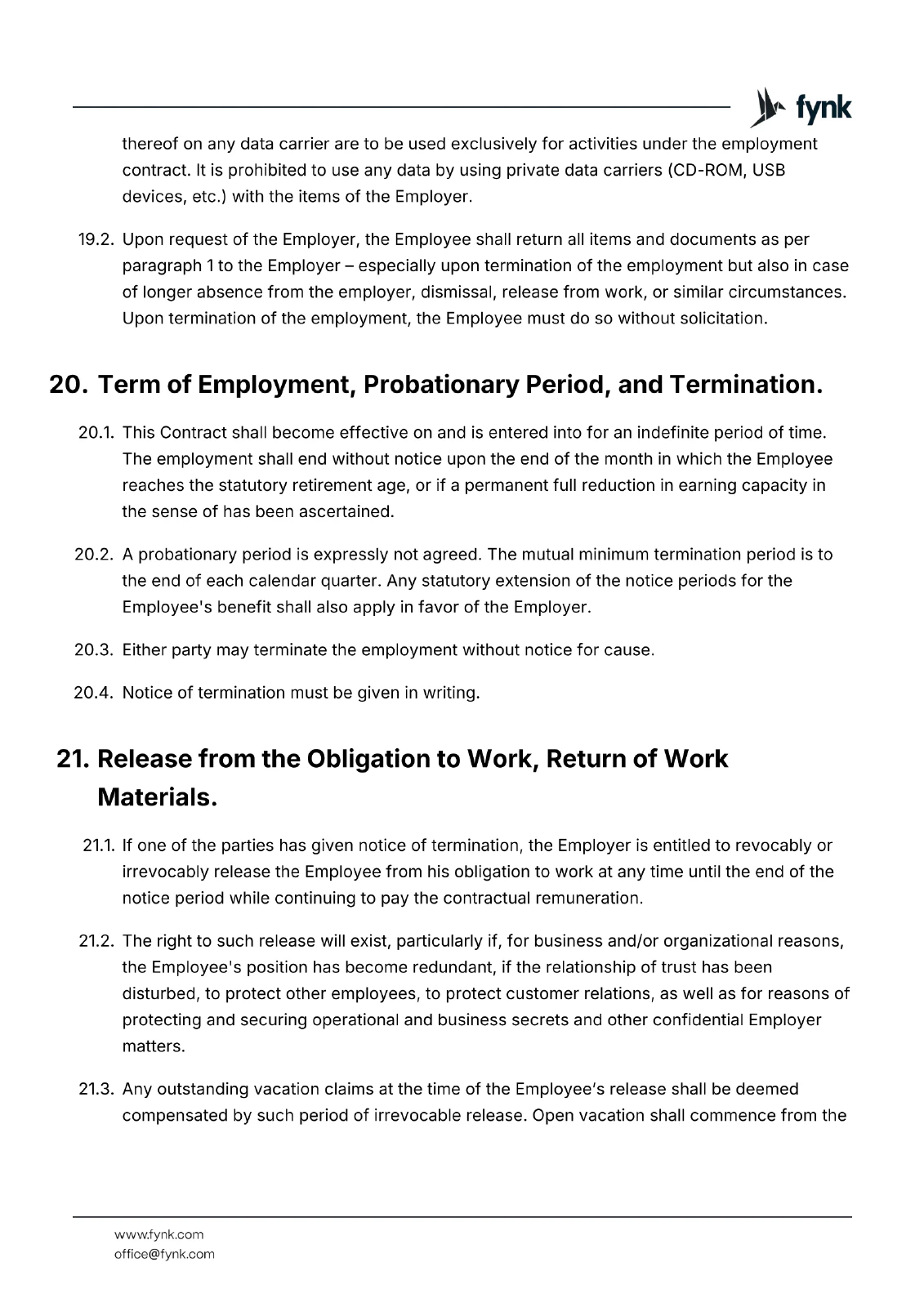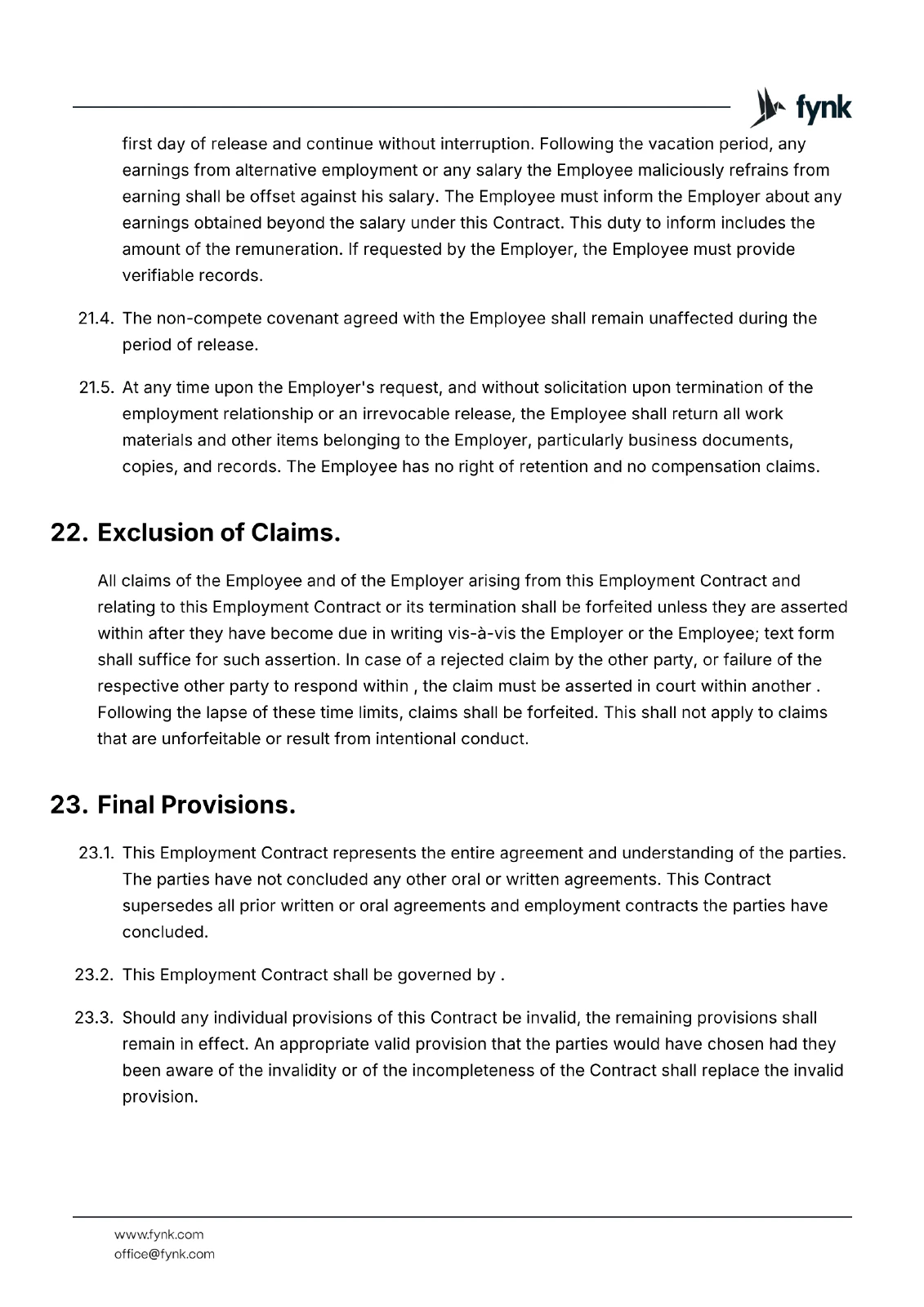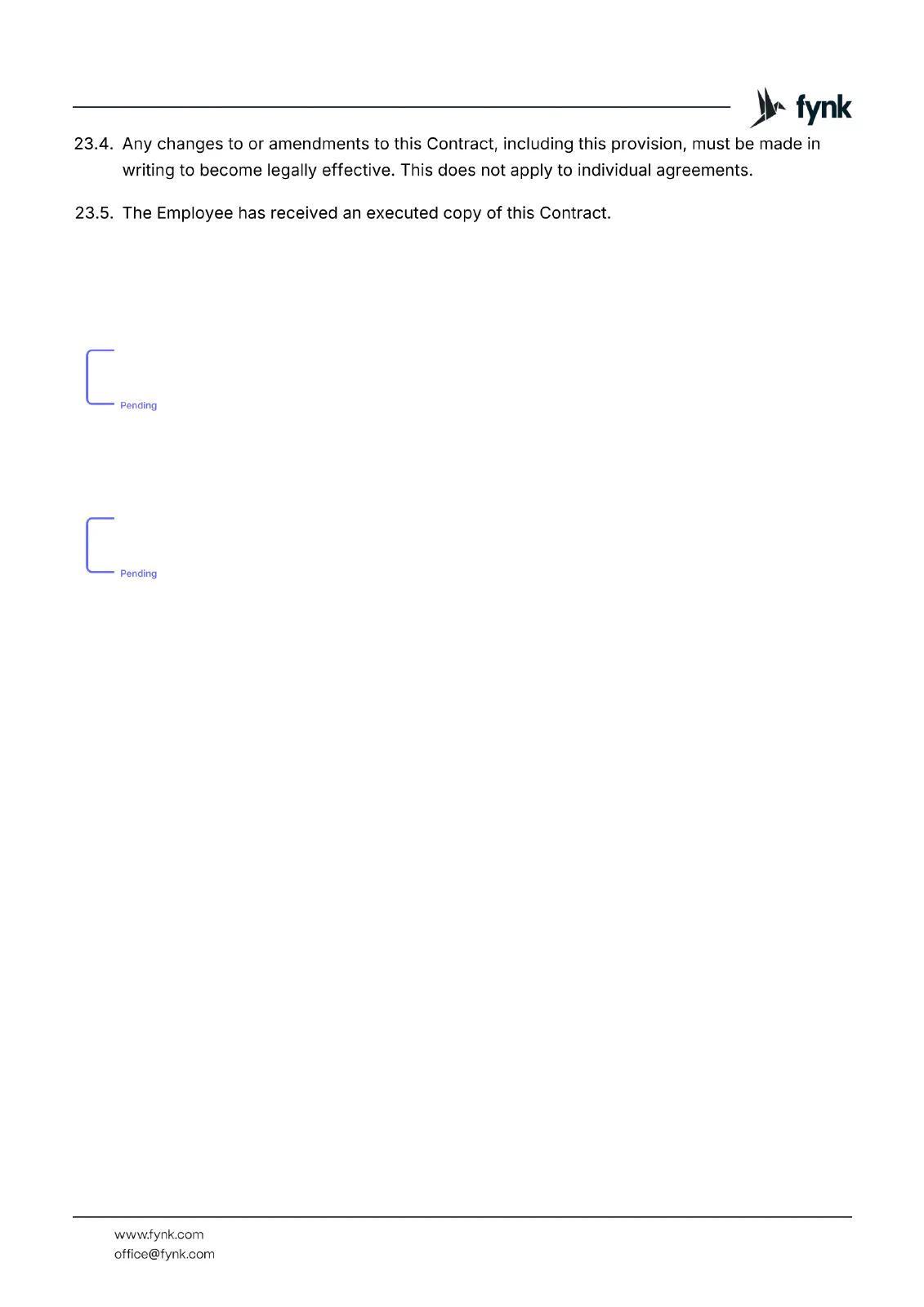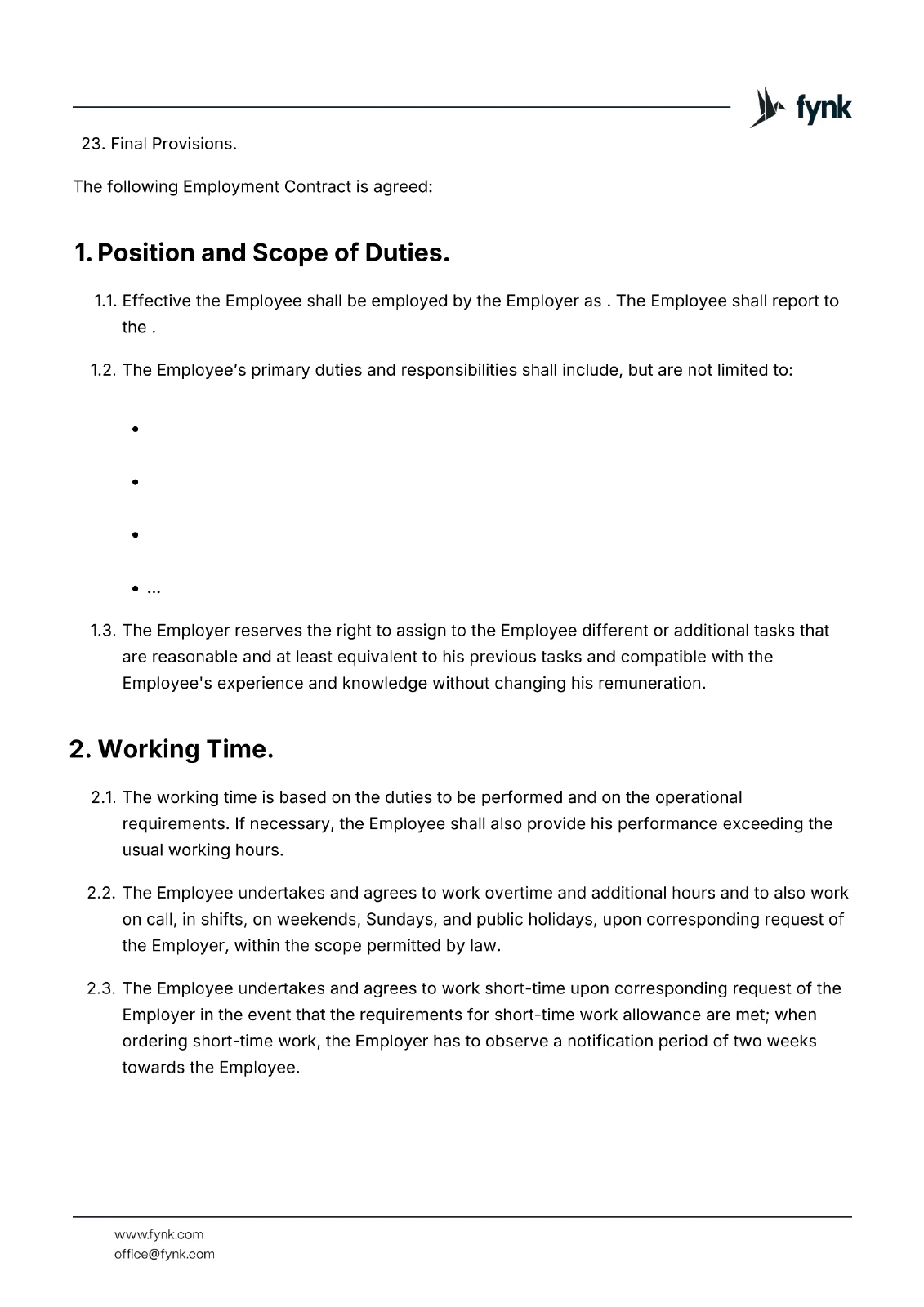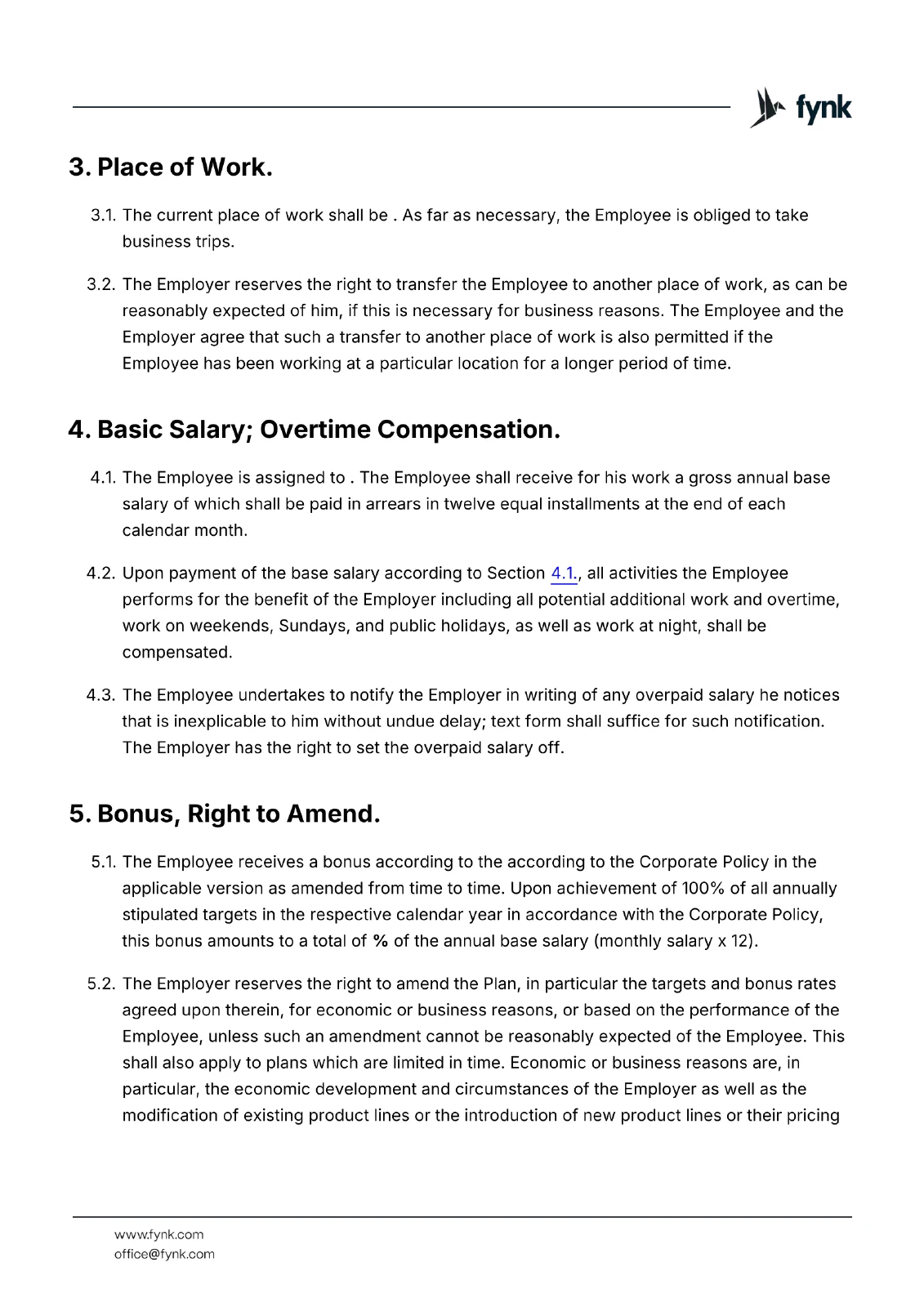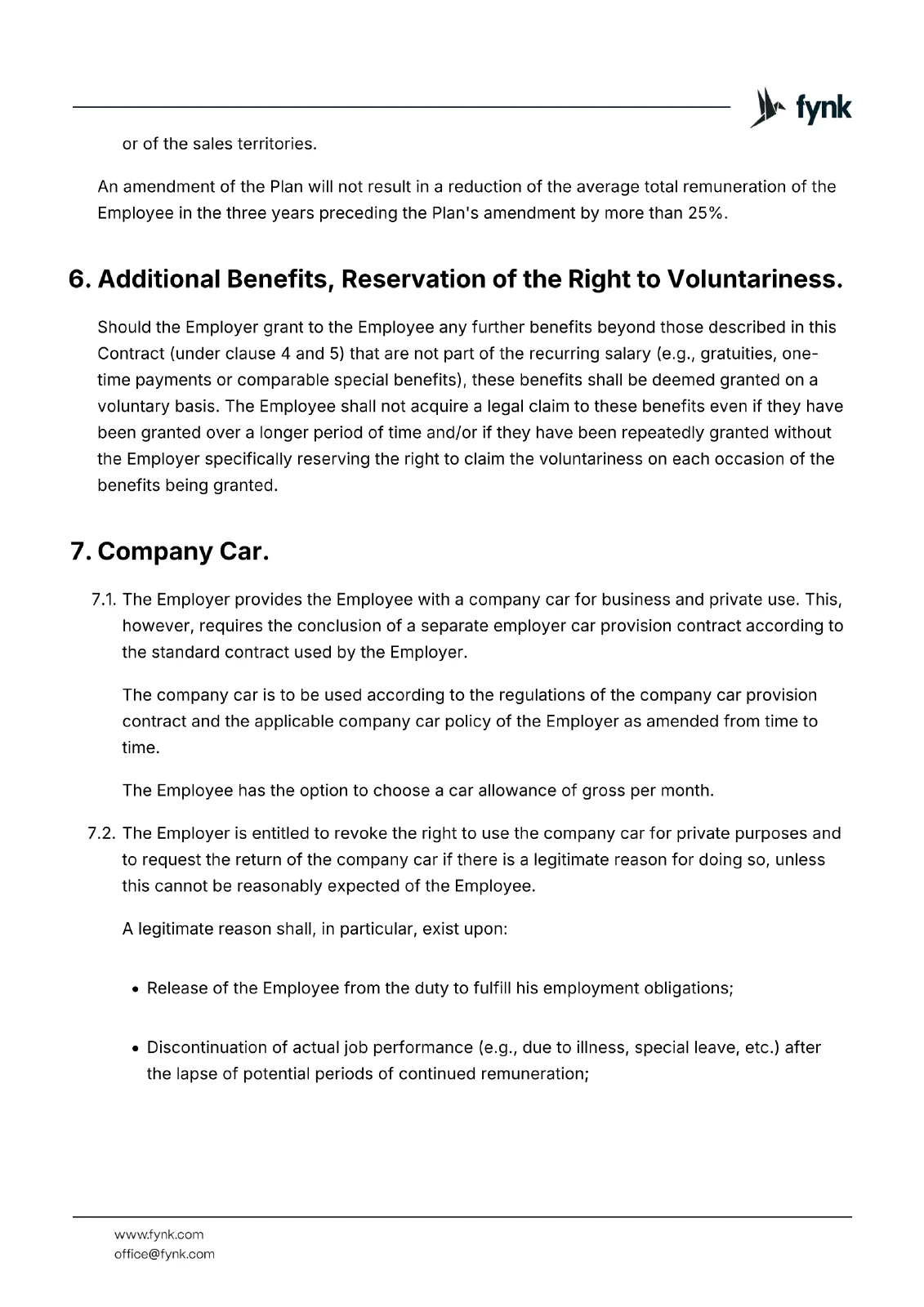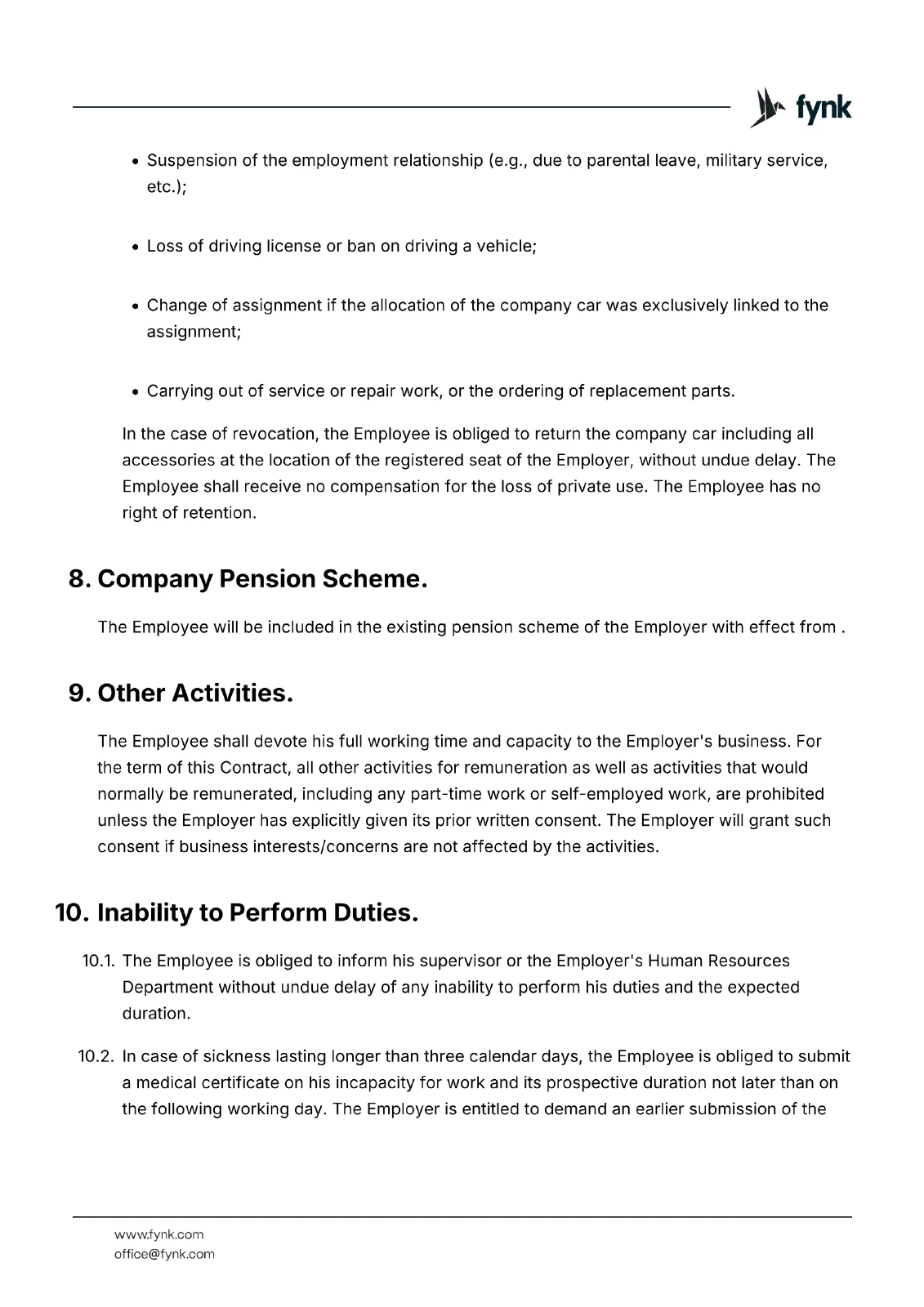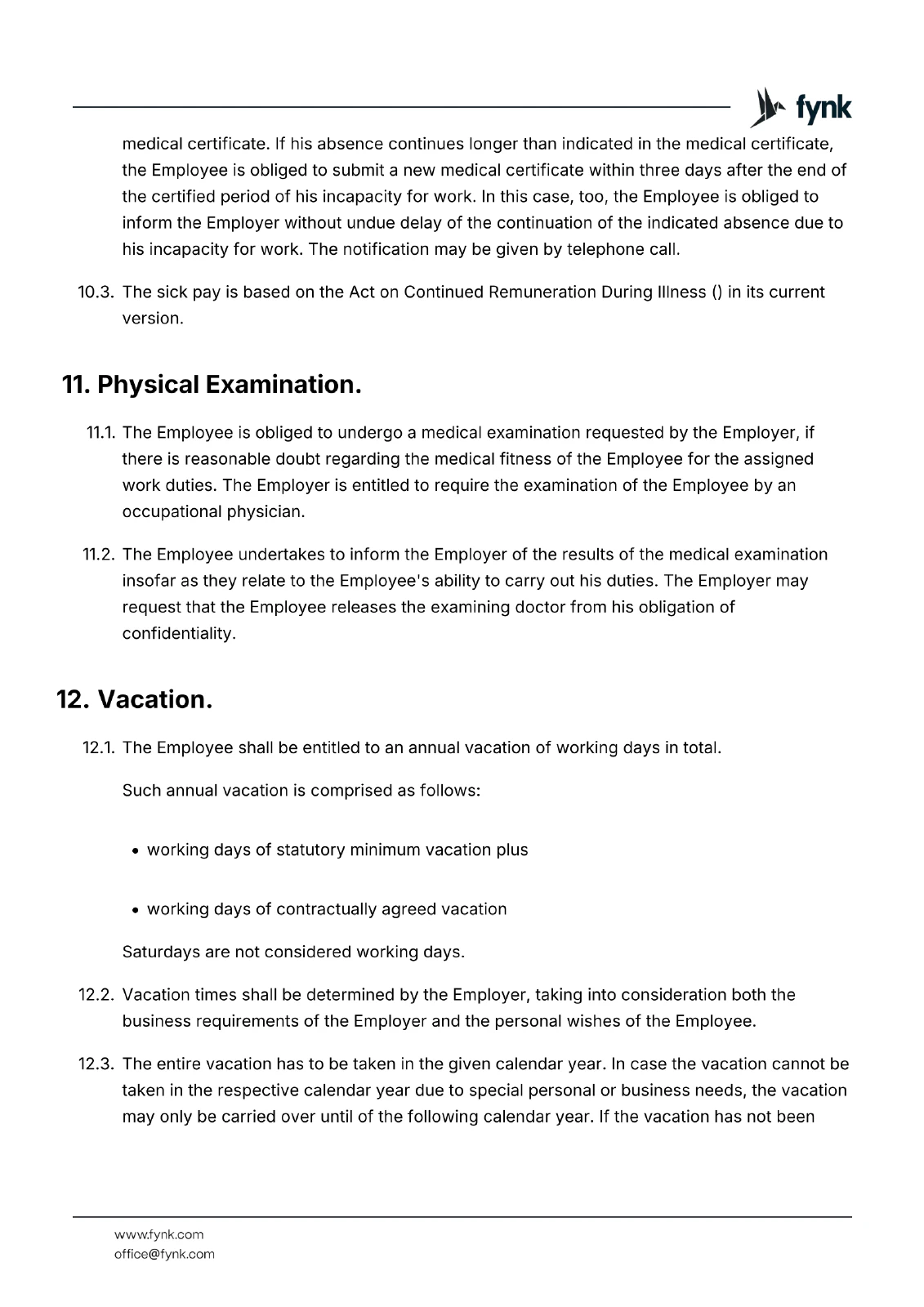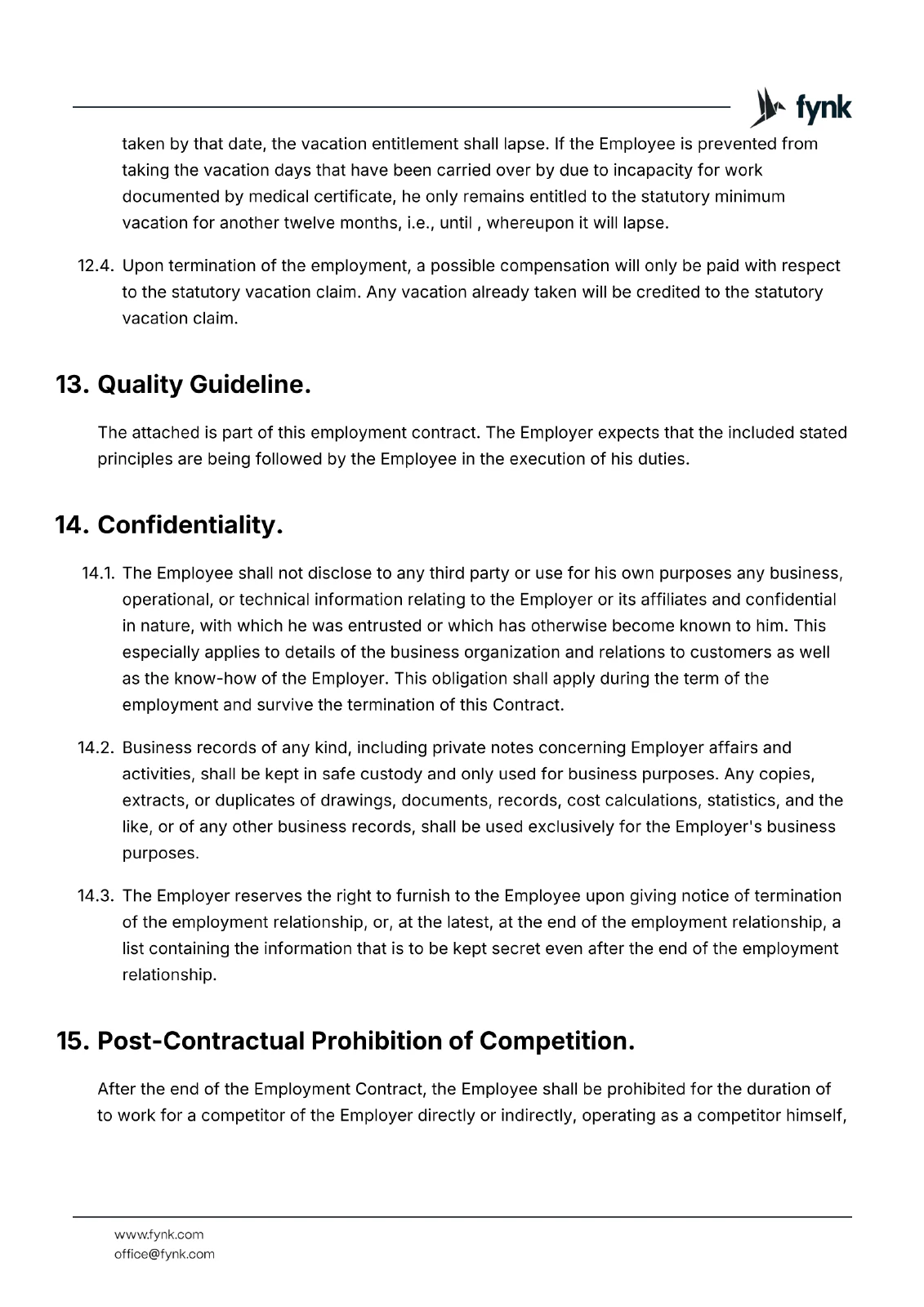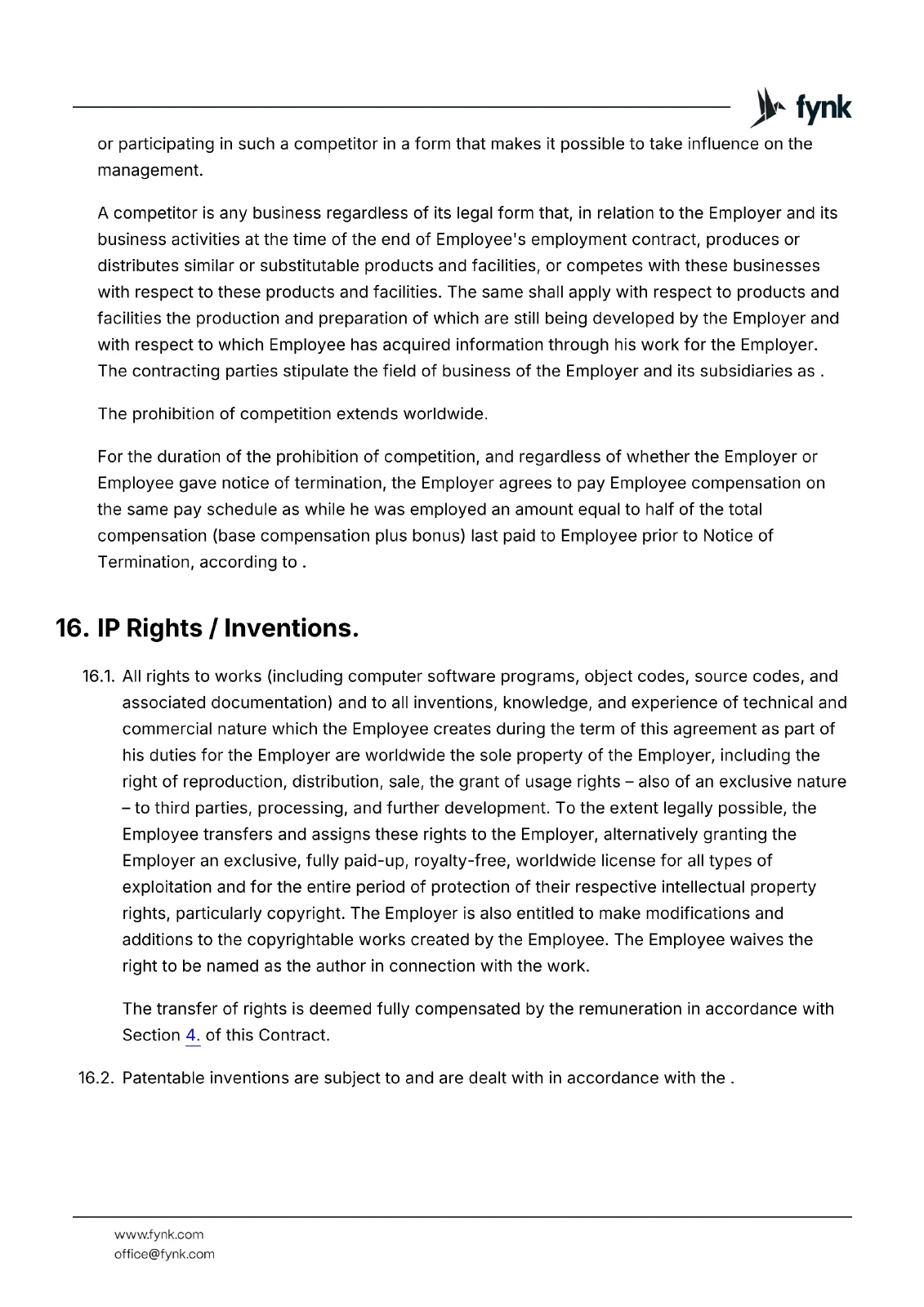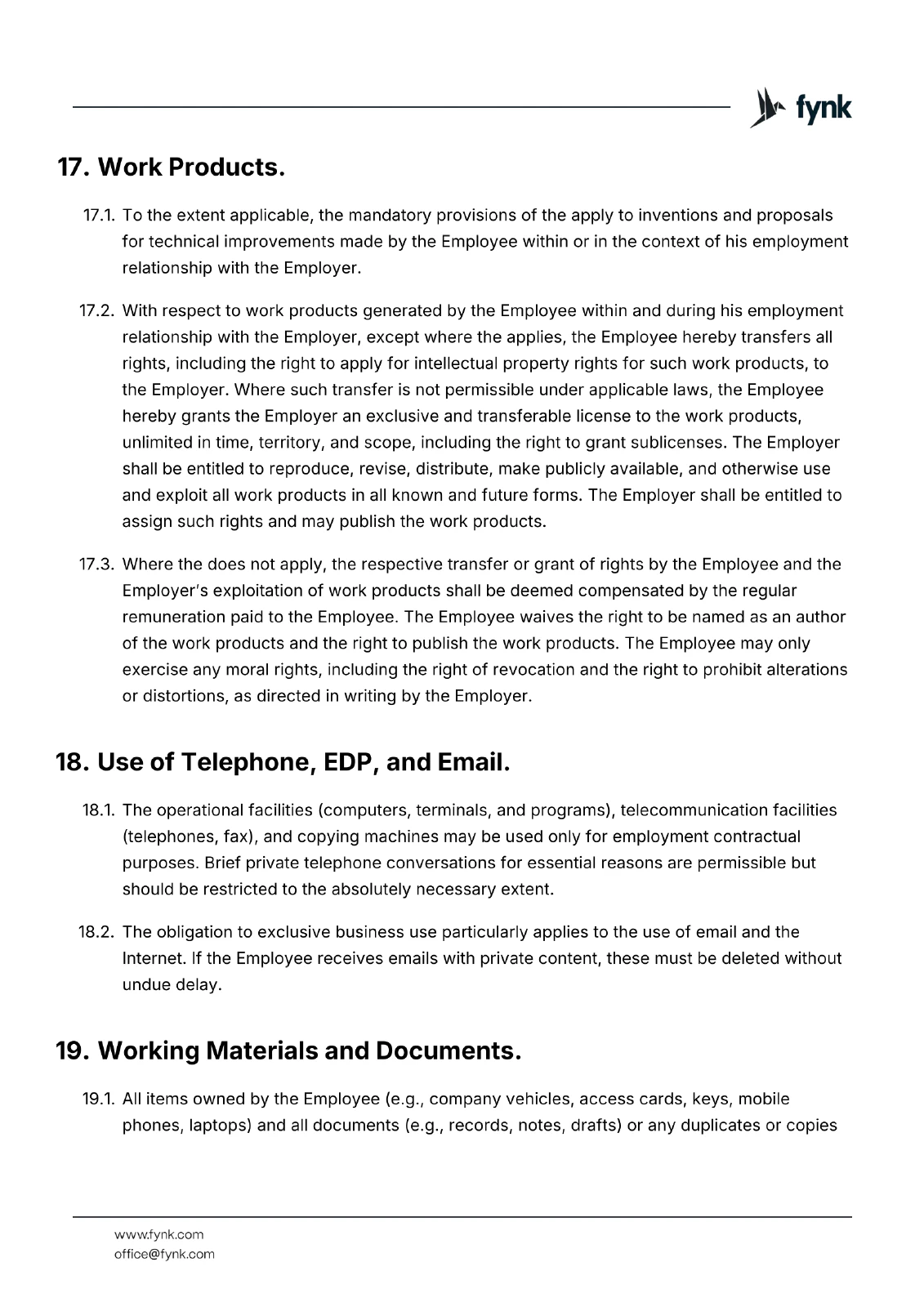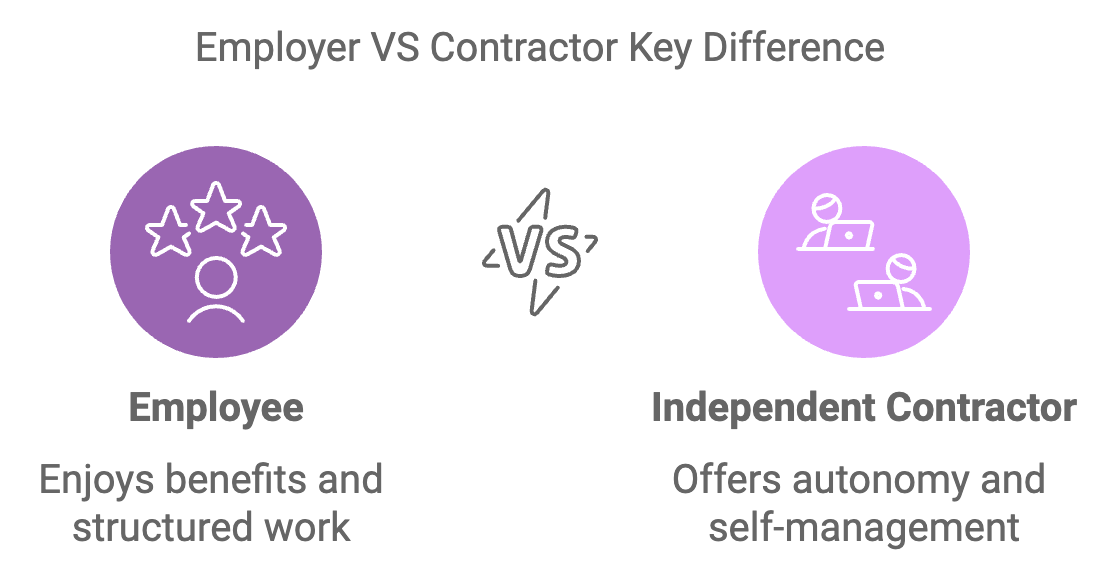Permanent Employment Contract
Between
(hereinafter “Employer”)
And
(hereinafter “Employee”)
The following Employment Contract is agreed:
Position and Scope of Duties.
Effective the Employee shall be employed by the Employer as . The Employee shall report to the .
The Employee’s primary duties and responsibilities shall include, but are not limited to:
…
The Employer reserves the right to assign to the Employee different or additional tasks that are reasonable and at least equivalent to his previous tasks and compatible with the Employee's experience and knowledge without changing his remuneration.
Working Time.
The working time is based on the duties to be performed and on the operational requirements. If necessary, the Employee shall also provide his performance exceeding the usual working hours.
The Employee undertakes and agrees to work overtime and additional hours and to also work on call, in shifts, on weekends, Sundays, and public holidays, upon corresponding request of the Employer, within the scope permitted by law.
The Employee undertakes and agrees to work short-time upon corresponding request of the Employer in the event that the requirements for short-time work allowance are met; when ordering short-time work, the Employer has to observe a notification period of two weeks towards the Employee.
Place of Work.
The current place of work shall be . As far as necessary, the Employee is obliged to take business trips.
The Employer reserves the right to transfer the Employee to another place of work, as can be reasonably expected of him, if this is necessary for business reasons. The Employee and the Employer agree that such a transfer to another place of work is also permitted if the Employee has been working at a particular location for a longer period of time.
Basic Salary; Overtime Compensation.
The Employee is assigned to . The Employee shall receive for his work a gross annual base salary of which shall be paid in arrears in twelve equal installments at the end of each calendar month.
Upon payment of the base salary according to Section 4.1., all activities the Employee performs for the benefit of the Employer including all potential additional work and overtime, work on weekends, Sundays, and public holidays, as well as work at night, shall be compensated.
The Employee undertakes to notify the Employer in writing of any overpaid salary he notices that is inexplicable to him without undue delay; text form shall suffice for such notification. The Employer has the right to set the overpaid salary off.
Bonus, Right to Amend.
The Employee receives a bonus according to the according to the Corporate Policy in the applicable version as amended from time to time. Upon achievement of 100% of all annually stipulated targets in the respective calendar year in accordance with the Corporate Policy, this bonus amounts to a total of % of the annual base salary (monthly salary x 12).
The Employer reserves the right to amend the Plan, in particular the targets and bonus rates agreed upon therein, for economic or business reasons, or based on the performance of the Employee, unless such an amendment cannot be reasonably expected of the Employee. This shall also apply to plans which are limited in time. Economic or business reasons are, in particular, the economic development and circumstances of the Employer as well as the modification of existing product lines or the introduction of new product lines or their pricing or of the sales territories.
An amendment of the Plan will not result in a reduction of the average total remuneration of the Employee in the three years preceding the Plan's amendment by more than 25%.
Additional Benefits, Reservation of the Right to Voluntariness.
Should the Employer grant to the Employee any further benefits beyond those described in this Contract (under clause 4 and 5) that are not part of the recurring salary (e.g., gratuities, one-time payments or comparable special benefits), these benefits shall be deemed granted on a voluntary basis. The Employee shall not acquire a legal claim to these benefits even if they have been granted over a longer period of time and/or if they have been repeatedly granted without the Employer specifically reserving the right to claim the voluntariness on each occasion of the benefits being granted.
Company Car.
The Employer provides the Employee with a company car for business and private use. This, however, requires the conclusion of a separate employer car provision contract according to the standard contract used by the Employer.
The company car is to be used according to the regulations of the company car provision contract and the applicable company car policy of the Employer as amended from time to time.
The Employee has the option to choose a car allowance of gross per month.
The Employer is entitled to revoke the right to use the company car for private purposes and to request the return of the company car if there is a legitimate reason for doing so, unless this cannot be reasonably expected of the Employee.
A legitimate reason shall, in particular, exist upon:
Release of the Employee from the duty to fulfill his employment obligations;
Discontinuation of actual job performance (e.g., due to illness, special leave, etc.) after the lapse of potential periods of continued remuneration;
Suspension of the employment relationship (e.g., due to parental leave, military service, etc.);
Loss of driving license or ban on driving a vehicle;
Change of assignment if the allocation of the company car was exclusively linked to the assignment;
Carrying out of service or repair work, or the ordering of replacement parts.
In the case of revocation, the Employee is obliged to return the company car including all accessories at the location of the registered seat of the Employer, without undue delay. The Employee shall receive no compensation for the loss of private use. The Employee has no right of retention.
Company Pension Scheme.
The Employee will be included in the existing pension scheme of the Employer with effect from .
Other Activities.
The Employee shall devote his full working time and capacity to the Employer's business. For the term of this Contract, all other activities for remuneration as well as activities that would normally be remunerated, including any part-time work or self-employed work, are prohibited unless the Employer has explicitly given its prior written consent. The Employer will grant such consent if business interests/concerns are not affected by the activities.
Inability to Perform Duties.
The Employee is obliged to inform his supervisor or the Employer's Human Resources Department without undue delay of any inability to perform his duties and the expected duration.
In case of sickness lasting longer than three calendar days, the Employee is obliged to submit a medical certificate on his incapacity for work and its prospective duration not later than on the following working day. The Employer is entitled to demand an earlier submission of the medical certificate. If his absence continues longer than indicated in the medical certificate, the Employee is obliged to submit a new medical certificate within three days after the end of the certified period of his incapacity for work. In this case, too, the Employee is obliged to inform the Employer without undue delay of the continuation of the indicated absence due to his incapacity for work. The notification may be given by telephone call.
The sick pay is based on the Act on Continued Remuneration During Illness () in its current version.
Physical Examination.
The Employee is obliged to undergo a medical examination requested by the Employer, if there is reasonable doubt regarding the medical fitness of the Employee for the assigned work duties. The Employer is entitled to require the examination of the Employee by an occupational physician.
The Employee undertakes to inform the Employer of the results of the medical examination insofar as they relate to the Employee's ability to carry out his duties. The Employer may request that the Employee releases the examining doctor from his obligation of confidentiality.
Vacation.
The Employee shall be entitled to an annual vacation of working days in total.
Such annual vacation is comprised as follows:
working days of statutory minimum vacation plus
working days of contractually agreed vacation
Saturdays are not considered working days.
Vacation times shall be determined by the Employer, taking into consideration both the business requirements of the Employer and the personal wishes of the Employee.
The entire vacation has to be taken in the given calendar year. In case the vacation cannot be taken in the respective calendar year due to special personal or business needs, the vacation may only be carried over until of the following calendar year. If the vacation has not been taken by that date, the vacation entitlement shall lapse. If the Employee is prevented from taking the vacation days that have been carried over by due to incapacity for work documented by medical certificate, he only remains entitled to the statutory minimum vacation for another twelve months, i.e., until , whereupon it will lapse.
Upon termination of the employment, a possible compensation will only be paid with respect to the statutory vacation claim. Any vacation already taken will be credited to the statutory vacation claim.
Quality Guideline.
The attached is part of this employment contract. The Employer expects that the included stated principles are being followed by the Employee in the execution of his duties.
Confidentiality.
The Employee shall not disclose to any third party or use for his own purposes any business, operational, or technical information relating to the Employer or its affiliates and confidential in nature, with which he was entrusted or which has otherwise become known to him. This especially applies to details of the business organization and relations to customers as well as the know-how of the Employer. This obligation shall apply during the term of the employment and survive the termination of this Contract.
Business records of any kind, including private notes concerning Employer affairs and activities, shall be kept in safe custody and only used for business purposes. Any copies, extracts, or duplicates of drawings, documents, records, cost calculations, statistics, and the like, or of any other business records, shall be used exclusively for the Employer's business purposes.
The Employer reserves the right to furnish to the Employee upon giving notice of termination of the employment relationship, or, at the latest, at the end of the employment relationship, a list containing the information that is to be kept secret even after the end of the employment relationship.
Post-Contractual Prohibition of Competition.
After the end of the Employment Contract, the Employee shall be prohibited for the duration of to work for a competitor of the Employer directly or indirectly, operating as a competitor himself, or participating in such a competitor in a form that makes it possible to take influence on the management.
A competitor is any business regardless of its legal form that, in relation to the Employer and its business activities at the time of the end of Employee's employment contract, produces or distributes similar or substitutable products and facilities, or competes with these businesses with respect to these products and facilities. The same shall apply with respect to products and facilities the production and preparation of which are still being developed by the Employer and with respect to which Employee has acquired information through his work for the Employer. The contracting parties stipulate the field of business of the Employer and its subsidiaries as .
The prohibition of competition extends worldwide.
For the duration of the prohibition of competition, and regardless of whether the Employer or Employee gave notice of termination, the Employer agrees to pay Employee compensation on the same pay schedule as while he was employed an amount equal to half of the total compensation (base compensation plus bonus) last paid to Employee prior to Notice of Termination, according to .
IP Rights / Inventions.
All rights to works (including computer software programs, object codes, source codes, and associated documentation) and to all inventions, knowledge, and experience of technical and commercial nature which the Employee creates during the term of this agreement as part of his duties for the Employer are worldwide the sole property of the Employer, including the right of reproduction, distribution, sale, the grant of usage rights – also of an exclusive nature – to third parties, processing, and further development. To the extent legally possible, the Employee transfers and assigns these rights to the Employer, alternatively granting the Employer an exclusive, fully paid-up, royalty-free, worldwide license for all types of exploitation and for the entire period of protection of their respective intellectual property rights, particularly copyright. The Employer is also entitled to make modifications and additions to the copyrightable works created by the Employee. The Employee waives the right to be named as the author in connection with the work.
The transfer of rights is deemed fully compensated by the remuneration in accordance with Section 4. of this Contract.
Patentable inventions are subject to and are dealt with in accordance with the .
Work Products.
To the extent applicable, the mandatory provisions of the apply to inventions and proposals for technical improvements made by the Employee within or in the context of his employment relationship with the Employer.
With respect to work products generated by the Employee within and during his employment relationship with the Employer, except where the applies, the Employee hereby transfers all rights, including the right to apply for intellectual property rights for such work products, to the Employer. Where such transfer is not permissible under applicable laws, the Employee hereby grants the Employer an exclusive and transferable license to the work products, unlimited in time, territory, and scope, including the right to grant sublicenses. The Employer shall be entitled to reproduce, revise, distribute, make publicly available, and otherwise use and exploit all work products in all known and future forms. The Employer shall be entitled to assign such rights and may publish the work products.
Where the does not apply, the respective transfer or grant of rights by the Employee and the Employer’s exploitation of work products shall be deemed compensated by the regular remuneration paid to the Employee. The Employee waives the right to be named as an author of the work products and the right to publish the work products. The Employee may only exercise any moral rights, including the right of revocation and the right to prohibit alterations or distortions, as directed in writing by the Employer.
Use of Telephone, EDP, and Email.
The operational facilities (computers, terminals, and programs), telecommunication facilities (telephones, fax), and copying machines may be used only for employment contractual purposes. Brief private telephone conversations for essential reasons are permissible but should be restricted to the absolutely necessary extent.
The obligation to exclusive business use particularly applies to the use of email and the Internet. If the Employee receives emails with private content, these must be deleted without undue delay.
Working Materials and Documents.
All items owned by the Employee (e.g., company vehicles, access cards, keys, mobile phones, laptops) and all documents (e.g., records, notes, drafts) or any duplicates or copies thereof on any data carrier are to be used exclusively for activities under the employment contract. It is prohibited to use any data by using private data carriers (CD-ROM, USB devices, etc.) with the items of the Employer.
Upon request of the Employer, the Employee shall return all items and documents as per paragraph 1 to the Employer – especially upon termination of the employment but also in case of longer absence from the employer, dismissal, release from work, or similar circumstances. Upon termination of the employment, the Employee must do so without solicitation.
Term of Employment, Probationary Period, and Termination.
This Contract shall become effective on and is entered into for an indefinite period of time. The employment shall end without notice upon the end of the month in which the Employee reaches the statutory retirement age, or if a permanent full reduction in earning capacity in the sense of has been ascertained.
A probationary period is expressly not agreed. The mutual minimum termination period is to the end of each calendar quarter. Any statutory extension of the notice periods for the Employee's benefit shall also apply in favor of the Employer.
Either party may terminate the employment without notice for cause.
Notice of termination must be given in writing.
Release from the Obligation to Work, Return of Work Materials.
If one of the parties has given notice of termination, the Employer is entitled to revocably or irrevocably release the Employee from his obligation to work at any time until the end of the notice period while continuing to pay the contractual remuneration.
The right to such release will exist, particularly if, for business and/or organizational reasons, the Employee's position has become redundant, if the relationship of trust has been disturbed, to protect other employees, to protect customer relations, as well as for reasons of protecting and securing operational and business secrets and other confidential Employer matters.
Any outstanding vacation claims at the time of the Employee’s release shall be deemed compensated by such period of irrevocable release. Open vacation shall commence from the first day of release and continue without interruption. Following the vacation period, any earnings from alternative employment or any salary the Employee maliciously refrains from earning shall be offset against his salary. The Employee must inform the Employer about any earnings obtained beyond the salary under this Contract. This duty to inform includes the amount of the remuneration. If requested by the Employer, the Employee must provide verifiable records.
The non-compete covenant agreed with the Employee shall remain unaffected during the period of release.
At any time upon the Employer's request, and without solicitation upon termination of the employment relationship or an irrevocable release, the Employee shall return all work materials and other items belonging to the Employer, particularly business documents, copies, and records. The Employee has no right of retention and no compensation claims.
Exclusion of Claims.
All claims of the Employee and of the Employer arising from this Employment Contract and relating to this Employment Contract or its termination shall be forfeited unless they are asserted within after they have become due in writing vis-à-vis the Employer or the Employee; text form shall suffice for such assertion. In case of a rejected claim by the other party, or failure of the respective other party to respond within , the claim must be asserted in court within another . Following the lapse of these time limits, claims shall be forfeited. This shall not apply to claims that are unforfeitable or result from intentional conduct.
Final Provisions.
This Employment Contract represents the entire agreement and understanding of the parties. The parties have not concluded any other oral or written agreements. This Contract supersedes all prior written or oral agreements and employment contracts the parties have concluded.
This Employment Contract shall be governed by .
Should any individual provisions of this Contract be invalid, the remaining provisions shall remain in effect. An appropriate valid provision that the parties would have chosen had they been aware of the invalidity or of the incompleteness of the Contract shall replace the invalid provision.
Any changes to or amendments to this Contract, including this provision, must be made in writing to become legally effective. This does not apply to individual agreements.
The Employee has received an executed copy of this Contract.

